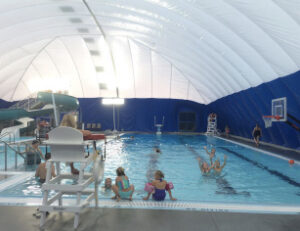Pool Progress: Behind the Scenes of the Lopez Swim Center
FLIP Speaks with Water Technology Inc.’s Ryan Nachreiner
The campaign to build the Lopez Swim Center has retooled and is better than ever after project delays last year that were beyond our control. This eight-part series will provide you with project updates, along with interviews from aquatic experts, leaders, and community members behind the campaign. This is part one of our eight-part series.
PROJECT UPDATES

Cost savings—Project leaders made the following planning decisions to reduce project costs without sacrificing quality:
- Simplified design of the shower house
- Selected energy-efficient equipment for lower operating costs and durability
- Became a seasonal indoor/outdoor pool (instead of an indoor pool with a retractable roof) to save both costs and energy. A heated, air-inflated dome will go up in fall for indoor swimming in cooler months. In late spring, the dome will be deflated and stored, for open-air swimming. Left, above: In cold weather, an air-inflated Arizon dome will provide a warm space to enjoy both pools. During the summer, the dome will be removed for open-air swimming.
Timeline—We hope to open the Swim Center in late 2024. Please understand that in our post-COVID world, construction projects remain vulnerable to staffing, cost escalation/funding, and supply-chain issues that could impact this timeline. We are also waiting for the San Juan County permit (see more details in our next article).
Lopez Swim Center Talks with Water Technology Inc.’s Ryan Nachreiner, Regional Director of Project Development
LSC: What is Water Technology Inc.’s role with the Lopez Swim Center project?
WTI: Water Technology Inc. (WTI) is a specialized design firm focused solely on aquatic recreation. For the Lopez Swim Center, we prepared the design and engineering drawings and the specifications for the mechanical and water-treatment systems. These designs are crucial to obtain permit approvals, to bid contract work, and to guide the facility’s construction.
LSC: What is WTI’s experience in the Pacific Northwest and with local regulators?
WTI: WTI has been working in the Pacific Northwest, and Washington state in particular, for over 25 years. As the largest and most experienced aquatic design team in North America, we take a personalized approach to each region where we operate. In the Puget Sound and Salish Sea area, we’ve built a long history and strong relationships with local regulations and code officials.
I live in Bellingham and make a point of being involved in issues affecting our industry at the regional level. I serve on a Department of Health advisory board that is responsible for revisions to state pool codes. WTI also works across the country and in Europe, Asia, and the Middle East developing destination waterparks and family aquatic centers. This experience gives us access to the latest trends and technologies across five continents. No other aquatic firm brings our extensive experience in the Puget Sound and Salish Sea area and the industry knowledge, resources, and technologies from our work around the world.
LSC: Can you talk about some of the equipment that Lopez Swim Center has selected for the new pool?
WTI: Good choices of materials and equipment are crucial for the long-term operation of the facility, especially considering the remoteness of and streamlined staffing operation needs of this facility. Each of the major mechanical components—pumps, filters, controllers, and disinfection systems—are being provided by established companies with highly refined product lines. Equipment was selected for its durability and serviceability. The pools will be constructed using preconstructed steel panels made by Myrtha Pools, a company known for having one of highest quality methods for pool construction with a 25-year warranty. The choice of steel Myrtha pools eliminates the need to for draining them every 3 to 7 years like traditional pools, saving significant water consumption as well as operating costs. With these quality products, the Lopez Swim Center will be able to have manufacturer support over the facility’s lifespan.
LSC: Pools are known to be energy hogs. How are you addressing cost and conservation?
WTI: Pools are energy users, but the Lopez Swim Center has made decisions that significantly reduce its energy consumption. For the Swim Center, we tackled waste and inefficiency in three areas: water and space heating; water filtration; and water circulation / pumping. The most important investment is that the Center will operate with heat pumps powered by electricity. The net result is a 75% reduction in annual operating costs and eliminating the use of 48,000 gallons of propane annually. Secondly, we’ll use advanced filtration with regenerative media filters, which uses up to 90% less water than more common filtration systems, and at the same time, does a better job filtering particles out of the water. This matters because the less water a pool uses, the less energy that’s needed to heat that water.
The largest energy users in pools typically are the pumps that continuously circulate water through the filtration and water treatment system. For efficiency, we’ll have a variable frequency drive on every pump motor directing it to run at precisely the power it needs and preventing wasted energy.
LSC: How does the pool’s design support a positive swimming experience?
WTI: The Lopez Swim Center will offer a broad range of programming for pool users of all ages. There are children learning to swim and retirees keeping healthy and fit, plus a range of swimmers between. To best serve the different pool users and the different types of programming, we designed two separate pools that can be kept at two different temperatures. This allows, for example, the Lopez Swim Center to host water exercise classes in one pool with warmer water to benefit joints and muscles, while keeping another pool at a lower temperature that’s more suitable for lap swimming or swimming lessons. Of course, safe and sanitary water is essential to a positive swimming experience. Advanced filtration and automated UV disinfection systems will continuously provide exceptional water quality; a supplemental sanitation system will provide extra protection against pathogens in addition to the primary disinfection system.
To learn more about the campaign for the Lopez Swim Center contact:
Anne Marie MacPherson, Executive Director Friends of Lopez Island Pool, at director@lopezislandpool.org
This article series is supported by a grant from the Lopez Thrift Shop.